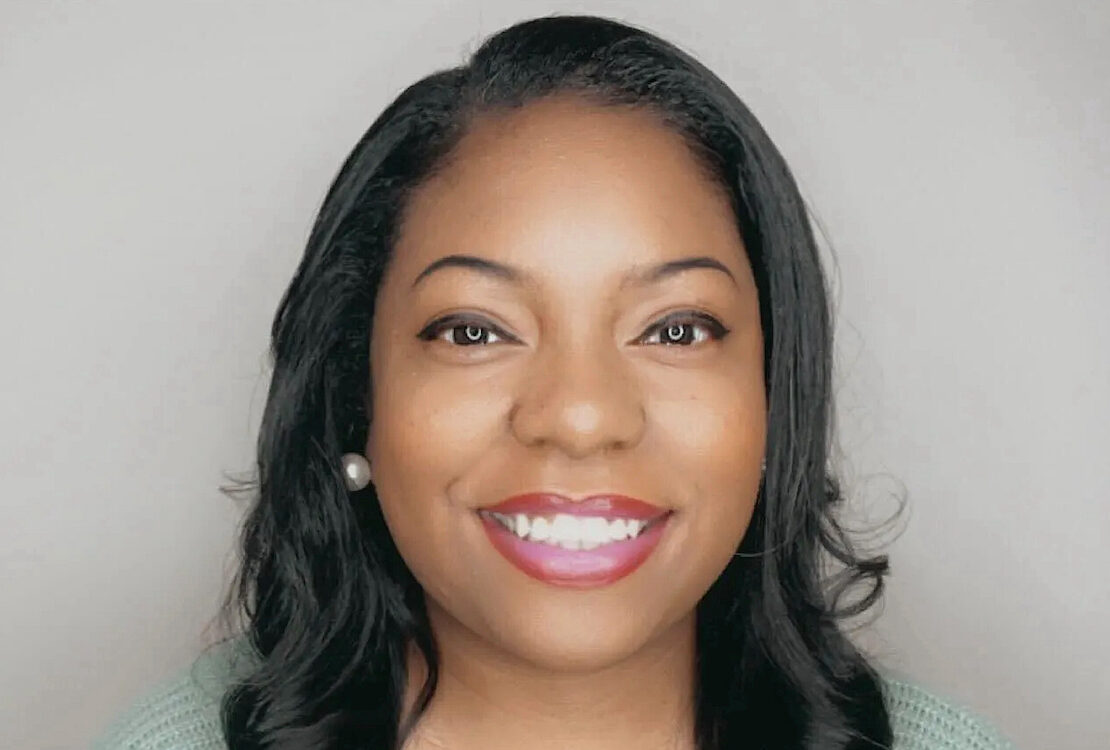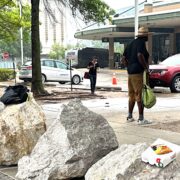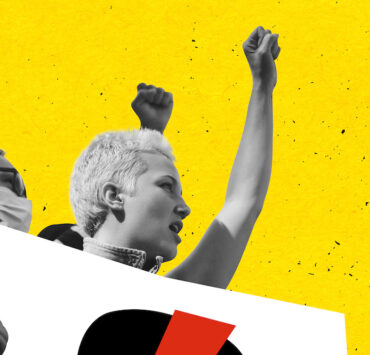Studies show every year more Black folks with mental illnesses are receiving mental health services, but the numbers are staggeringly low when compared to white people.
Mental health in the Black community is often not discussed and clouded with fear of being called crazy. Silence, suffering, and trauma are often rampant in the community, and seeking mental health treatment is considered taboo. But things are starting to shift.
She calls herself the “Twitter therapist,” — and Nicole Lewis, a licensed clinical social worker, is working to create a safe space for Black folks in their healing journey. She’s licensed in more than a half dozen states and has her own virtual private practice called Legacy Wellness Services.
Lewis says she became a therapist after falling in love with the T.V. show “Law & Order Special Victims Unit.” Her favorite character was Dr. Huang, the forensic psychologist known for helping solve the cases. Although a fictional character planted the initial seed, Lewis says as an LCSW, she loves how she can connect with folks who look like her to help them heal and process the trauma of being Black in America.
Studies show every year, more Black folks with mental illnesses are receiving mental health services, but the numbers are staggeringly low when compared to white people. During a recent sit-down with Word In Black, Lewis tells us why more folks in our community need to seek mental health services and how she is using social media to have a broader impact.
Word In Black: Are you a therapist exclusively for Black folks, and why is it important for you to create a safe space for Black people to have mental health help?
Nicole Lewis: I specialize in treating Black adults. However, every now and then, I do see individuals who are non-Black if they seek me out. It’s important because less than 4% of therapists are Black. A lot of the time, we may have to see someone who doesn’t look like us or may not relate to our culture.
They could be very great therapists, but they may misunderstand some things because they don’t understand our lingo or where we come from. So, it’s important for me to specialize in treating Black adults because I want them to have a place where they can feel completely comfortable, safe, and feel like they can show up as their authentic selves.
WIB: When Black folks are seeking treatment from someone non-Black and experiencing misunderstandings, how do you think that impacts the efforts made to continue getting help?
Lewis: I think it has a negative impact. If you go to someone who constantly has to ask you, what do you mean by that, it can be frustrating because now you have to educate them on what you’re talking about when they should be understanding.
So, if you go to someone else that doesn’t look like you, you might have the same thing happen and after a while, you might not want to go back to therapy period. Because you might just think it’s all therapists that are doing that and think nobody understands me, and I’ve seen it happen before. But it’s super important to get someone who can relate to you, and they can be of a different race, but they have to put in a lot of work to understand people who look like us.
WIB: How would you describe the relationship between mental health in the Black community?
Lewis: There’s still a lot of stigmas. Nobody wants to be perceived as being crazy. (My clients) will say to me that their parents have said you don’t need to be talking to them white people about our business because most therapists are white.
And they don’t want them to know about what’s going on because history says that they can use some of that against us. I have to educate people that it’s OK to seek therapy, you don’t have to talk with somebody you don’t feel comfortable with even if that’s a Black person and they make you feel uncomfortable, you can find someone else.
There’s so much history that has gone wrong with medical professionals doing things to people of color, and really, we have good reason to doubt it. But as time goes on and people get more familiar with it, they start feeling more comfortable with trying to reach out because they see one of their loved ones reaching out.
And then there’s also stigma about taking medication for your mental health. They think (therapists) are trying to ‘poison us’ or ‘that’s not for me, that means I’m really crazy if I have to take medication,’ and that’s not true. We have to do some psychoeducation on how the medication works, but it’s getting better but there’s still a lot of work to do.
WIB: What was behind the Tweet that went viral this week and have you gotten any surprising responses?
Lewis: As Black women, we have been socialized to be the strong Black woman and feel like we have to do everything to be perfect. And that’s just not reasonable, so we get more degrees because we think this is what I’m supposed to be doing. But sometimes, that can be an avoidance tactic. We don’t want to work on ourselves, and we wanna stay busy so that we don’t have to sit in stillness and process some of the things we’ve been through. So, getting a degree is difficult, but sitting in our feelings may be a little bit more challenging.
It kind of bothered me because a few Black women who work in academics, they did not like it. There were all the think pieces about how hard we have to work to get to where we want to be, and some said (my Tweet) diminishes all the hard work that they’ve done. And that’s not what I said.
Which kind of proves my point that we can have all this education, but if we haven’t worked on our own stuff, it’s going to show up like in this instance. I was not downplaying anybody getting degrees, I have degrees, and I probably should have gone to therapy before getting these degrees, but I didn’t.
Even after I got my master’s degree, I went to cosmetology school for a couple of months. I had no reason to be doing that. I had a newborn, and I was just doing too much, I should have just gone to therapy instead. Some people didn’t like (my Tweet), I know I stepped on some toes and snatched some edges, but that’s the type of therapist that I am.
WIB: You have recently been Tweeting therapy-based worksheets on your page. Tell me about your goal behind this.
Lewis: I’ve been getting a lot of questions about boundaries, so I started giving out homework, as I call it, for people who may not have access to a therapist at this time or people who are seeing a therapist but need some extra support. I wanted to offer that to people because it’s super, super important to have resources and I think we all deserve access to care, regardless of our income level.
Going back to the stigma about therapy, we need to be putting up some boundaries when someone tells us, ‘No, you don’t have to go to therapy. There’s nothing wrong with you’ — that’s not OK. We have to learn how to stand up for ourselves, so I plan to give something new out every Sunday. If people have any questions, they can tweet me or DM me.
It’s my honor to serve people. My background is in social work, and part of that is social justice and advocating for people who may not have a voice for themselves. So, it brings me a lot of joy to be able to share these things with people because it’s important.
WIB: Why is it important for you to use social media to provide Black folks with mental health resources?
Lewis: As an individual practitioner, I can’t see a lot of clients — I usually keep a caseload of around 15 to 20 clients because it can be some difficult work. So, if I’m only seeing 20 clients, there’s so many other people that need resources. It’s important for me to use social media because that’s where most people are at.
WIB: I can only imagine the traumatic situations you hear, but how are you checking in with your mental health?
Lewis: So, it can be heavy, and I keep a therapist. I think all therapists should have a therapist because we are sitting with so much trauma and pain, and we have to keep it to ourselves. It’s not like we can go talk to a friend, we can’t share that stuff because it’s confidential.
I do trust my therapist and we don’t really talk about clients; we talk about the impact that they have on me. I do keep it in my documentation that sometimes I may share with a professional to get better insight, so if I do have difficulties, I can go to (my therapist) and ask what would you do in this situation. It works for me, and it helps my clients, too, just in case something comes up that I may not be aware of.
WIB: For someone who doesn’t have the money or is in crisis, how can those in our community get help?
Lewis: Unfortunately, the resources that are out there, I’m not a big fan of because they don’t do enough training — like the suicide hotline. I think it’s a wonderful thing, but they don’t have the education behind it, so they may not be saying the right thing. And there’s constant turnover because some people are just looking for a job, and they feel like it’s too heavy or they can’t handle it. There just aren’t enough workers because people are on hold for a long time, it’s a good concept, but it may not be great in practice.
I do tell people to call the hotline if they need to, but just be prepared that you may have to wait. There’s a text hotline as well — it’s free … I really like that one because they respond quickly. It’s easier for people to text than to talk about their feelings.
There are self-help books. PDFdrive.com, if you just type in anything like grief, anxiety, or depression, there’ll be several books that will pop up. Because it’s hard to talk to people, it’s hard to reach out to a therapist even as a therapist, I get anxious trying to find a new one like I don’t know what they’re gonna think of me.
If someone needs a new therapist, I am available. I also help people find therapists. They can schedule a 15-minute consultation, and they can tell me what they’re looking for. And I will use my resources to help find someone that I think may be appropriate for them. So, I give them a list. of therapists to try out. And then I tell them if those don’t work out, let me know, and we’ll look some more.
Resources, links for mental health help
- NAMI, the National Alliance on Mental Illness, is the nation’s largest grassroots mental health organization dedicated to building better lives for the millions of Americans affected by mental illness.
- Legacy Wellness Services promotes emotional well-being and provides personalized care to Black adults who want to lead more productive and vibrant lives.
- Mental Health Resources for the Black Community
- The Black Mental Health Alliance










